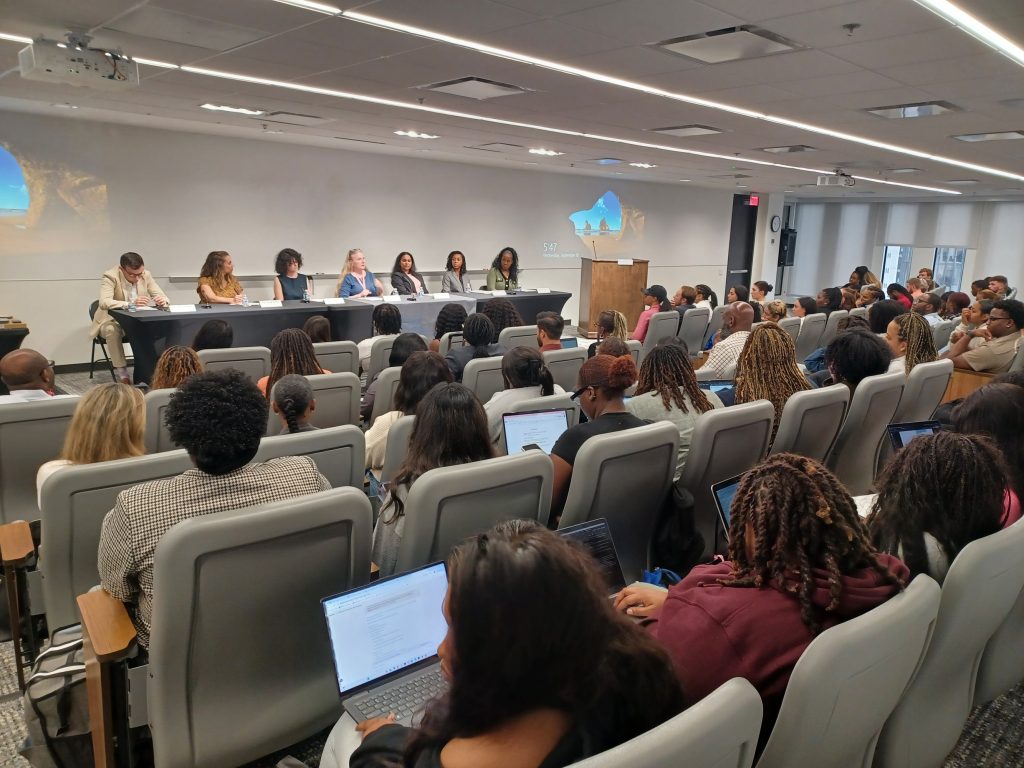
Atlanta’s John Marshall Law School (AJMLS) was honored to be selected by the State Bar of Georgia’s Lawyer Assistance Program Subcommittee to host its groundbreaking pilot program, which focuses on wellness and mental health. The State Bar’s decision to launch the pilot at AJMLS is a testament to the law school’s leadership in prioritizing wellness as a core element of legal education and its commitment to the well-being of its students. The program’s success at AJMLS has paved the way for its expansion, as the Lawyer Assistance Program will now offer the initiative at other law schools across the state.
The panelists for this program included a psychologist, a licensed clinical social worker, several attorneys, an AJMLS professor (Professor Adams) and two AJMLS students (Natasha Torrence and Austin Cauffman). The discussion was moderated by Attorney Herb Brown, a member of the LAP Subcommittee.
The panel was deeply engaging and insightful and covered a wide range of important topics related to mental health and well-being, especially in the context of law school. A summary of the key points that were discussed is below:
Substance Misuse
- Signs: Panelists highlighted various indicators of substance misuse, such as changes in behavior, neglecting responsibilities, and physical symptoms.
- Confrontation: They provided guidance on how to approach someone struggling with substance misuse, emphasizing empathy and support rather than judgment.
- Personal Experiences: Panelists shared their own journeys with substance misuse, illustrating the importance of awareness and seeking help.
Stress and Anxiety in Law School
- Signs: Recognizing symptoms like chronic worry, difficulty concentrating, and physical manifestations (e.g., headaches) was discussed.
- Support Strategies: The importance of reaching out to classmates and professors was emphasized, along with suggestions for fostering open conversations about mental health.
- Personal Experiences: Attorney panelists shared their coping strategies and experiences managing stress during law school.
Burnout
- Signs: Identifying signs of burnout, such as fatigue, detachment, and reduced performance, was a key topic.
- Coping Mechanisms: Suggestions included self-care practices, time management, and taking breaks to recharge.
- Study Groups: The pros and cons of study groups were discussed as a potential way to mitigate burnout, with recommendations for maintaining balance.
Depression
- Signs: Recognizing signs of depression in oneself and others was emphasized, including persistent sadness, withdrawal, and changes in appetite or sleep.
- Supporting Classmates: Panelists provided advice on how to approach a classmate showing signs of depression, stressing the importance of compassion and encouraging them to seek professional help.
- Personal Stories: Experiences shared about coping with loss highlighted the impact of grief and the importance of support networks.
The panel was designed to help attendees feel less isolated and more empowered to seek assistance and support. Asking for help is a sign of strength and self-awareness and it leads to opportunities for personal growth and development. Included below is the contact information for our counselors. Please email or call your preferred counselor using the information provided to schedule an appointment.
1Alliance Counseling and Psychotherapy Services
678-310-6631
info@1AllianceCPS.com
Dr. Ted Liberty
404-556-6322
Dr. Josephine Almanzar
404-369-0609
Cecil Walker (Midtown Psychotherapy Associates)
470-231-9640
